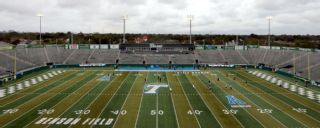|
Imagine a scenario in which the Big 12 expands by four teams and adds current presumptive favorites Houston, BYU and Cincinnati. The league, obviously, would still need a fourth school. Imagine next that the conference conceivably concludes that Connecticut and Central Florida are too far away. Imagine then that the decision comes down to, say, Memphis and Tulane. And then keep in mind that the presidents and chancellors -- not the football coaches and athletic directors -- will be making the call. On the surface, it might seem far-fetched for Big 12 expansion to include a school that has just five bowl appearances since the 1970s and exactly one double-digit winning season in its history. But in the scenario of a four-school grab, Tulane -- with its superior academic profile -- just might be the wild card as this expansion drama unfolds. When asked what the league would be looking for while vetting expansion candidates, Oklahoma president and Big 12 board chair David Boren said the conference would be looking at strength of the athletic programs, fan base, access to media markets and, in his words, "reputations of these institutions for integrity" and "the academic standards … and the level or research and teaching." By any measure, Tulane doesn't score well in athletics or fan base. But in academics, research and teaching, the school is a juggernaut. As one of 62 members of the distinguished Association of American Universities (AAU), Tulane is considered one of the top research institutions in the country. At the moment, the Big 12 claims only three AAU members in Texas, Kansas and Iowa State. That pales in comparison to the other Power 5 conferences. The Big Ten boasts 13 AAU members. The Pac-12 owns eight. The ACC holds five. Even the SEC has four. Adding to the sting, all four schools the Big 12 lost through realignment -- Colorado, Missouri, Texas A&M and at the time Nebraska -- carried AAU membership. As Boren said, the Big 12 will look to reinforce its competitive profile on the field through expansion. That's why Houston and BYU seem to be the favorites to join the league. But in this process, the Big 12 might aim to bolster its academic profile as well. And no school available would do more for that than the Green Wave. Along with Buffalo and Rice, Tulane is one of just three AAU institutions that compete at the FBS level yet don't reside in a Power 5 conference. "Tulane's greatest assets in this regard include our academic reputation, our standing among the nation's top research institutions as a member of the AAU and our location in the one of the premier cities in the country, New Orleans," Green Wave athletic director Troy Dannen said in a statement last week that alluded to Tulane's interest in the Big 12. As Dannen referenced, Tulane's location won't hurt its candidacy. New Orleans is the No. 51 TV market in the country and has become a recruiting pipeline of late for several Big 12 teams. Logistically, expanding into New Orleans also makes sense. On the field, however, Tulane has miles to go. Last season, the Green Wave had an average attendance of just under 23,000, which would've ranked last in the Big 12. Tulane hasn't had a first-round NFL draft pick since 2004, when quarterback J.P. Losman went 22nd overall to the Buffalo Bills. The football program hasn't enjoyed a watershed moment since 1998, when coach Tommy Bowden and quarterback Shaun King led the Green Wave to a Conference USA title and 12-0 record, which included a victory over BYU in the Liberty Bowl. According to Dannen, Tulane has committed $120 million in capital investments to the school's athletic facilities in recent years. With a better and more lucrative conference affiliation, Tulane would have resources to commit even more. Even then, competing in the Big 12 obviously wouldn't come easy for Tulane. But as one league official noted about Tulane's candidacy, the SEC has Vanderbilt, which might not win SEC titles but significantly enhances the conference's academic standing. Could Tulane become the Big 12's Vanderbilt? If the league expands by just two, likely not. Even among academic-minded chancellors and presidents, football strength and media market will be the first boxes checked off the expansion list. But if the league expands to 14? Tulane's academic prowess and AAU standing could begin to look mighty attractive.
|

